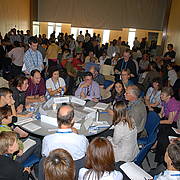Forests, fisheries and food security – full day at the forum!
08 October 2008 | News story
Activities at the IUCN World Conservation Congress forum continued apace today. IUCN started the day by announcing The Forests Dialogue’s Initiative on Forests and Climate Change, in partnership with the World Business Council for Sustainable Development.
The dialogue brought together more than 250 representatives of governments, forestry companies, trade unions, environmental and social groups, international organizations, forest owners, indigenous peoples and forest-community. For the first time, the group agreed on five guiding principles for climate change negotiators.
A report identifying the species which are particularly susceptible to climate change followed hot on the heels of the forests announcement. The IUCN Species Programme report showed that 35 percent of the world’s birds, 52 percent of amphibians and 71 percent of warm-water reef-building corals are likely to be susceptible to climate change. It also identified more than 90 biological traits which are believed to make species most susceptible to climate change.
IUCN went on to announce a cooperation agreement with CEPESCA (the Spanish Fishing Confederation) and FEAP (the European Federation of Aquaculture Producers). The agreement will focus on scientific data on fisheries, particularly those related to by-catch, and define a framework for the sustainable development of specific fisheries.
By-catch reared its ugly head again as one of the main threats facing sharks, according to an event organized by the Shark Alliance. Worldwide, 21 percent are classified as threatened. “The problem with this species is overfishing, whether as by-catch, for their fins or their meat,” says Sarah Fowler, Chair of the IUCN Shark Specialist Group and Policy Director of the Shark Alliance. “Sharks are long-lived and don’t have many young so their population only grows at a very slow rate.”
On a completely different note, ideas such as Bhutan’s Gross National Happiness and Thailand’s economic sufficiency philosophy were discussed at a workshop on oriental wisdom. This local wisdom should be applied to national development policies, according to the panelists.
Meanwhile, two more sustainability dialogues took place. The first, on greening construction, explored how to make buildings, which are responsible for at least 40 percent of energy use in developing countries, more environmentally-friendly.
The second, on human health and the environment, looked at how human health depends on biodiversity and investigated what is being done to ensure wild plants which produce effective medicines can be conserved.
The last day of the forum tomorrow promises to be just as busy.






